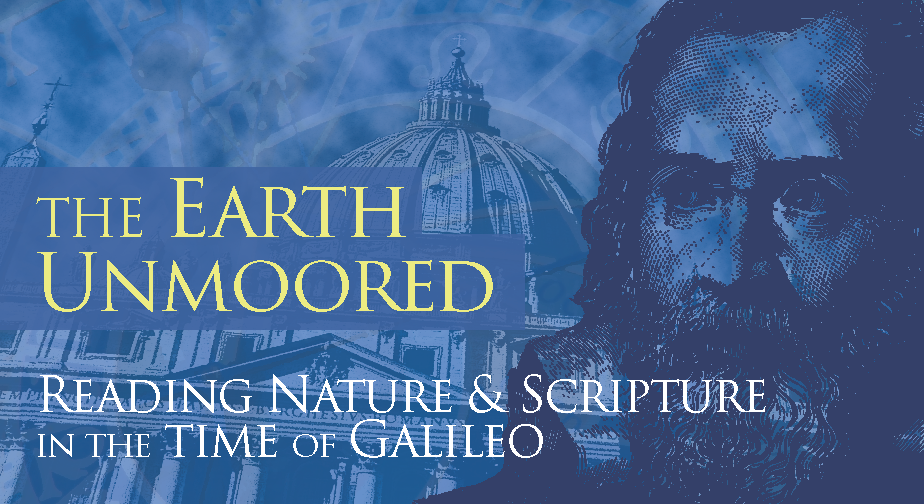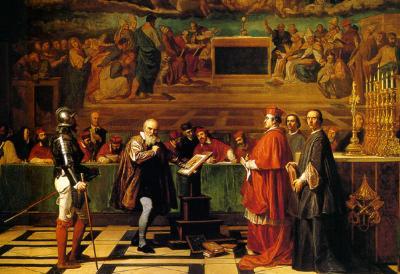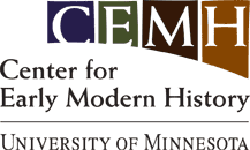Was Galileo a Heretic? You Be the Judge.

Join us for a unique staging of the Trial of Galileo - part of "The Earth Unmoored" series commemorating the 400-year anniversary of the Galileo Affair.
Date & Time:
3:30 PM - 5:00 PM
Registration:
Admission:
Location:
Frey- Moot Courtroom
University of St. Thomas School of Law
Minneapolis campus

In June 1633, the judges of the Roman Inquisition ruled 5-4 that Galileo Galilei’s writings defending the Copernican hypotheses of a mobile earth that orbits the sun, which had been declared contrary to scripture in 1616, made him guilty of vehement suspicion of heresy.
The ruling forever changed the relation between science and religion, but was the verdict just?
Join us for a unique staging of the Trial of Galileo as teams of undergraduates from the University of Minnesota make their case for and against Galileo to our distinguished panel of judges from the University of St. Thomas.
Consider the evidence for yourself and decide Galileo’s fate. You and the judges will reveal your verdict at the end of the simulation.
THE EARTH UNMOORED:
READING NATURE & SCRIPTURE IN THE TIME OF GALILEO
SERIES SCHEDULE
On March 5, 1616, the Congregation of the Index of the Roman Catholic Church placed the works of Copernicus on the Index of Prohibited books. They did so because Copernicus’ astronomical model held that “that the earth moves and the sun is motionless,” and this teaching was “altogether contrary to the Holy Scriptures.”
The Congregation’s decree continued a lively debate between some of the best minds in Europe on the relationship between the truth of scripture, astronomical phenomena, and the status of physical demonstration in the atural sciences. It pitted the great scholar and Jesuit (and eventual saint) Robert Bellarmine against the brilliant and abrasive Galileo Galilei, who would later be placed under house arrest by the Inquisition. The decree continued a lively debate among some of the best minds in Europe on the relationship among the truth of scripture, astornomical phenomena, and the status of phsyical demonstration in the natural sciences.
Join the debate as we commemorate the events of 1616 by bringing together a wide group of faculty from different disciplines and backgrounds to read and discuss the central texts and issues of the controversy. Seminar readings will be drawn from The Essential Galileo (Hackett Classics). Visiting speakers may recommend reading additional sources. Check the event pages for additional information.
9/16 Drawing on Galileo: Art, Astronomy, and Appropriation,
Eileen Reeves, Chair and Professor of Comparative Literature, Princeton University
10/07 Science, Theology, and Uncertainty: Notes on the Afterlife of the Galileo Affair
Stefania Tutino, Professor of History, UCLA
10/28 Forging the Moon; Or, How to Spot a Fake Galileo
Nick Wilding, Associate Professor of History, Georgia State University
11/18 The Telescope Against Copernicus:
Marius, Galileo, Riccioli, and the Problem of Telescopic Observations of Stars in the Early 17th Century
Christopher Graney, Professor of Physics, Jefferson Community and Technical College
11/22 Trial of Galileo
Frey Moot Courtroom, University of St. Thomas School of Law
(Application has been made for a continuing legal education credit)
1/27 Galileo and the Garden of Eden: Galileo’s Hermeneutics, Modern Christians, and Natural History
Ted Davis, Professor of the History of Science, Messiah College
Cosponsored by the University of Minnesota Center for Early Modern History and the University of St. Thomas Terrence J. Murphy Institute for Catholic Thought, Law, and Public Policy with additional support from the University of Minnesota Program for History of Science, Technology and Medicine, Minnesota Center for Philosophy of Science, Program for Religious Studies, Anselm House, and Consortium for the Study of the Premodern World; as well as the University of St. Thomas Department of Philosophy.

